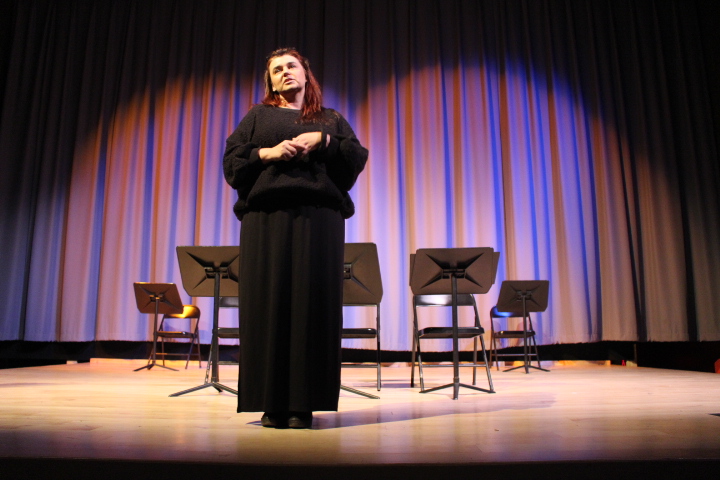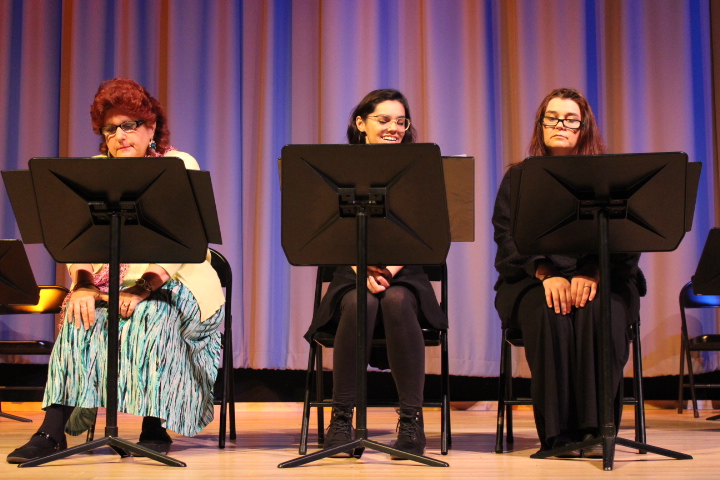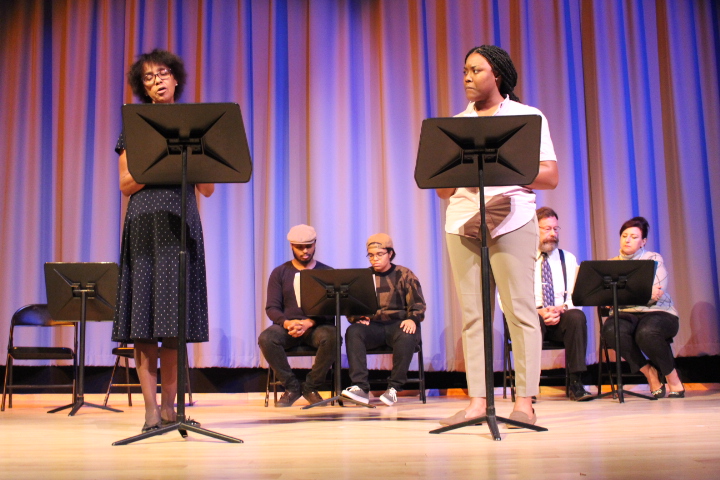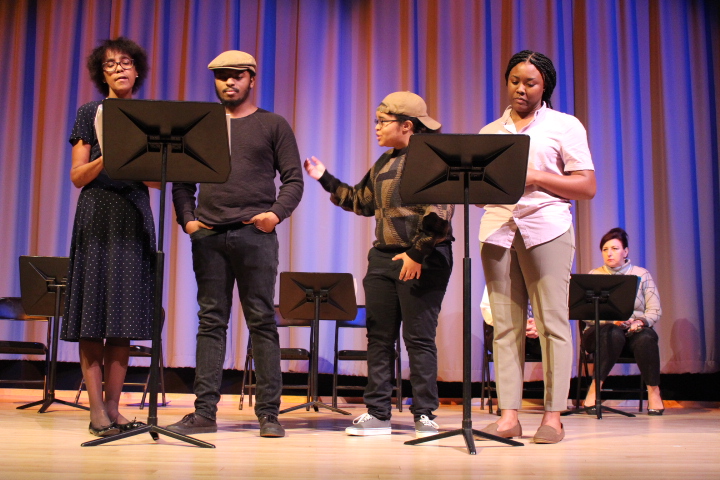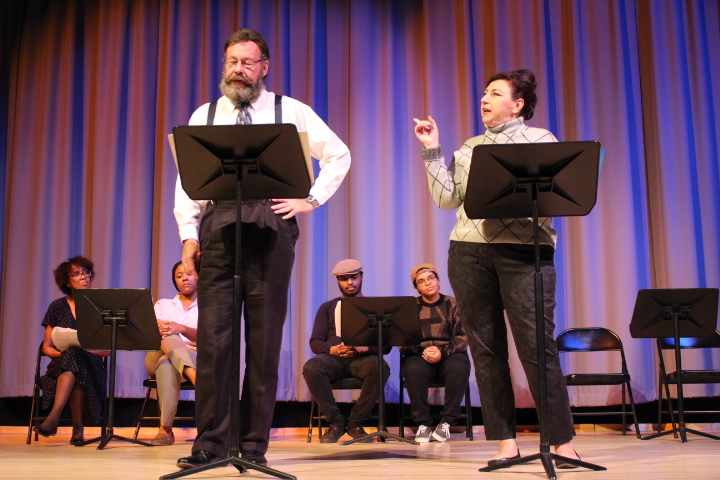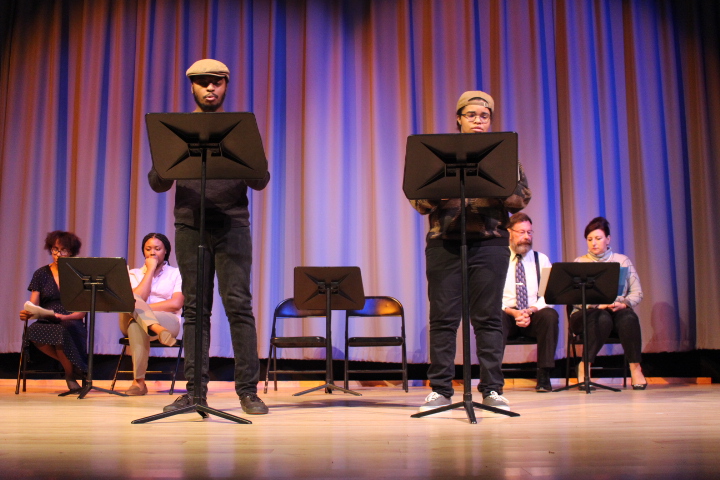FSU’s Annual One-Act Festival
Held at the Palace Theatre on Main Street, the Center for Literary Arts hosted their 9th annual One-Act Play Festival on Nov. 10. The event is for playwrights of all backgrounds and ages, who are given the opportunity to submit their work to a panel in the hopes of becoming a finalist in the competition. In the end, three winning plays were selected, with the rankings going from third place to first, and the playwrights who are chosen will be rewarded with a staged reading of their work.
The One-Act Play Festival was produced by CLA Director, Jennifer Browne, of the English Department; the Student Team led by Marshall Sandifer and Kat Wharton; Festival Director Heidi Gardner, and the Technical Director and Lighting Designer, Braxton Cooper.
This year, the winners were, starting at third place:
“When Good Times Say Goodbye” by Carl L. Williams – Williams’ play takes place in a funeral home, in which three women are mourning the loss of a man they each used to love. There’s Penny, the young, soft-hearted ex-wife, who speaks kindly and likes to reminisce about the good times she had during her marriage to the deceased. His [the deceased lover’s] first ex-wife, Cheryl, is blunt and doesn’t have a filter on her mouth, no matter the setting or occasion. She remembers more of the bad times they shared during their marriage. Verna was only his mistress-turned-girlfriend (he rejected her proposal), but it is discovered that she knows more about their ex and his illness than both Penny and Cheryl do. They spend time bonding over their memories with him and the fact that not many people showed up to the funeral. At some point in the play, they all find out that Mr. Wormley, the funeral director, is actually the dead man’s brother. Both he and Verna reveal to Penny and Cheryl that the deceased did not die of a stroke like they think he did — he had cancer and committed suicide.
The reading was directed by Dana Bridges. The actors in this play were Victoria Mann as Penny, Heidi Gardner as Cheryl, Ellen McDaniel Weissler as Verna, and Stephen Gumtz as Mr. Wormley.
In second place, “Agathe” by Angela J. Davis – Davis’ play chronicles Agathe Uwilingiyamana’s rise from Minister of Education to Prime Minister of Rwanda during early stages of the Rwandan Genocide of 1994. A narrator details the events of Uwilingiyamana’s life after the sudden deaths of both Rwanda and Burundi’s presidents following a plane crash. Uwilingiyamana was appointed Prime Minister the very same day, and from then on, her life changed drastically. As a moderate Hutu, Uwilingiyamana was already being sought after by Hutu extremists, but as Prime Minister, she and her children were an even bigger threat than before.
Throughout Davis’ portrayal of events, Uwilingiyamana makes an address to the nation of Rwanda, informing citizens about the deaths of President Juvénal Habyarimana and Burundian President Cyprien Ntaryamira. She also makes plans with her assistant Eddie and student Carrie, on how to safely get her children out of the home they were staying in at the time. Uwilingiyamana’s son, Lucas, worries for her safety and wants to stay by her side, but he is forced to leave with his siblings and to protect them. By the middle of the reading, Eddie is murdered while trying to help Uwilingiyamana escape. Captain Mbaye Diagne, an unarmed military observer, is introduced and he helps the children Carrie and the children safely get away. Uwilingiyamana leaves her home to address the nation again, this time having formulated a plan of how to make peace by sharing power with the Tutsi people, but is assassinated by Hutu militants.
The reading was directed by Mary Ann Chapman, and the actors were: Amaya Hatcher as Agathe Uwilingiyamana, Javell Lesli-Alston as Mbaye Diagne, Alexander Thomas as Lucas, Ana Marie Sines as Carrie, Bryan Kelleher as Eddie, and Hannah Twigg as Narrator.
The first-place play was “4/4/68” by Sharon Goldner – Goldner’s play focuses on two families in Baltimore, MD, after the assassination of political leader and Civil Rights Activist, Dr. Martin Luther King Jr., on April 4th, 1968. The play opens with Lucille and Francis talking, expressing their grief about Dr. King’s death. Lucille is a maid and has a son named Ennis, whom she wants to stay out of trouble while citizens are protesting their aggressions across town. Julius and Thalia, both white, are husband and wife, who live in the suburbs, and Julius owns a store in the inner-city. He wants nothing more than to help Black people, so he doesn’t understand why anyone would want to break into his store. He decides to spend a few nights sleeping at his place of business so that he can make sure it stays safe. Buildings are being broken into and burned up, and Ennis’ friend, Raynard, wants to take part in it. Raynard has stolen a gun and demonstrates to Ennis how he is ready to use it if he has to. Raynard has a plan to take over a store that has been broken into, and Julius, on the phone with his wife, hears a noise. Then there are the sounds of gunshots. No one ever finds out to whom the blood on Julius’ shirt belongs.
The reading was directed by Jordan Kline, and the actors were: Jha’Neal “Blue” Stoute as Lucille, Victoria Harvey as Francis, Brae Smith as Ennis, Brandon Huguley as Raynard, Kevin Shreve as Julius, and Beth Hilliker as Thalia.
Special thanks to supporters of the One-Act Play Festival: Amy Branam-Armiento, Jenna Gallion, Kevin Knott, Lydia Savramis, Ryan Thomas, Hailey Turner, Barry Weinberg, Michaela Hale, Palace Theatre staff, Main Street Books, FSU’s English Department, Community Trust Foundation, Halmos Art Fund, Allegany Arts Council, and the Maryland State Arts Council.


![IMG_4753[1]](https://thebottomlinenews.com/wp-content/uploads/2018/11/IMG_47531.jpg)
